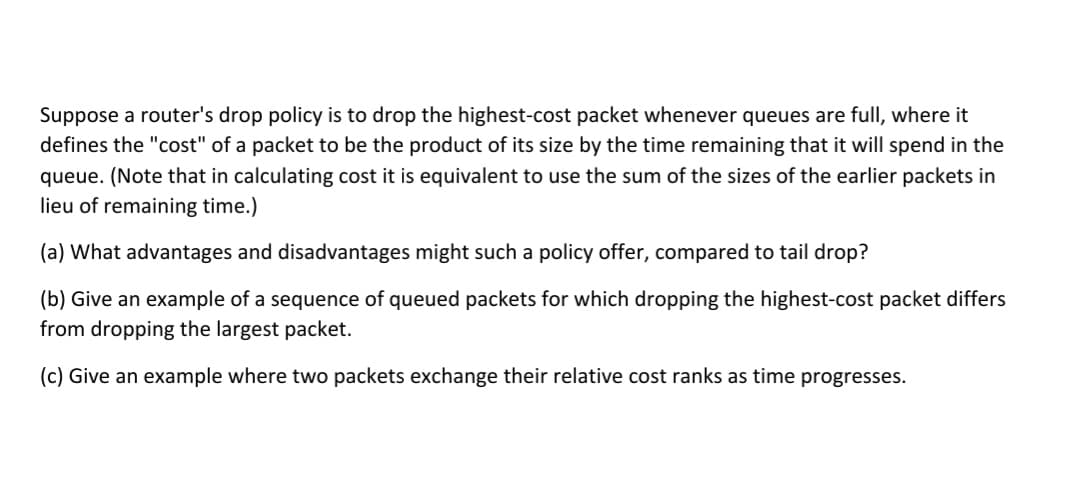Suppose a router's drop policy is to drop the highest-cost packet whenever queues are full, where it defines the "cost" of a packet to be the product of its size by the time remaining that it will spend in the queue. (Note that in calculating cost it is equivalent to use the sum of the sizes of the earlier packets in lieu of remaining time.) (a) What advantages and disadvantages might such a policy offer, compared to tail drop? (b) Give an example of a sequence of queued packets for which dropping the highest-cost packet differs from dropping the largest packet. (c) Give an example where two packets exchange their relative cost ranks as time progresses.
Suppose a router's drop policy is to drop the highest-cost packet whenever queues are full, where it defines the "cost" of a packet to be the product of its size by the time remaining that it will spend in the queue. (Note that in calculating cost it is equivalent to use the sum of the sizes of the earlier packets in lieu of remaining time.) (a) What advantages and disadvantages might such a policy offer, compared to tail drop? (b) Give an example of a sequence of queued packets for which dropping the highest-cost packet differs from dropping the largest packet. (c) Give an example where two packets exchange their relative cost ranks as time progresses.
Principles of Information Security (MindTap Course List)
6th Edition
ISBN:9781337102063
Author:Michael E. Whitman, Herbert J. Mattord
Publisher:Michael E. Whitman, Herbert J. Mattord
Chapter6: Security Technology: Access Controls, Firewalls, And Vpns
Section: Chapter Questions
Problem 2RQ
Related questions
Question

Transcribed Image Text:Suppose a router's drop policy is to drop the highest-cost packet whenever queues are full, where it
defines the "cost" of a packet to be the product of its size by the time remaining that it will spend in the
queue. (Note that in calculating cost it is equivalent to use the sum of the sizes of the earlier packets in
lieu of remaining time.)
(a) What advantages and disadvantages might such a policy offer, compared to tail drop?
(b) Give an example of a sequence of queued packets for which dropping the highest-cost packet differs
from dropping the largest packet.
(c) Give an example where two packets exchange their relative cost ranks as time progresses.
Expert Solution
This question has been solved!
Explore an expertly crafted, step-by-step solution for a thorough understanding of key concepts.
Step by step
Solved in 4 steps with 5 images

Knowledge Booster
Learn more about
Need a deep-dive on the concept behind this application? Look no further. Learn more about this topic, computer-science and related others by exploring similar questions and additional content below.Recommended textbooks for you

Principles of Information Security (MindTap Cours…
Computer Science
ISBN:
9781337102063
Author:
Michael E. Whitman, Herbert J. Mattord
Publisher:
Cengage Learning

Principles of Information Security (MindTap Cours…
Computer Science
ISBN:
9781337102063
Author:
Michael E. Whitman, Herbert J. Mattord
Publisher:
Cengage Learning